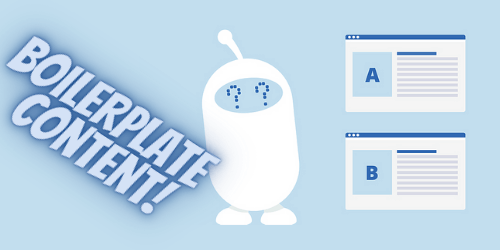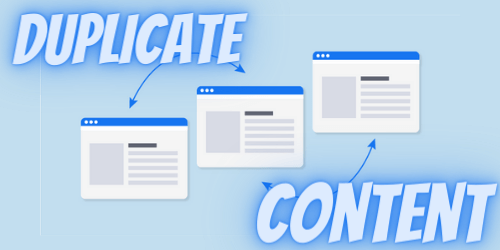Boilerplate Content in SEO
Almost every website on the internet has boilerplate content. Whether it is in your content, navigation sidebar, or within the terms and conditions, we all have it. It’s hard to say if Google pays attention to the copyright notice, disclaimer, or introductory blurb. These are pieces of text that may appear on every page on the website. However, how important is it to Google?
For starters, many researchers believe that ignoring similar text in the same documents or web page could help with search results for personalized searches. But the most important question would be, does your link anchor text to other blogs get ignored when the search engine tries to understand what the blog posts are about?
Further, will Google penalize the pages? Does it even look at this? Will it index it? Or does it simply ignore it? We unpack all of that here!

Boilerplate meaning
To get started, what does boilerplate mean.
A boilerplate is a text used in many different areas on a web design, website, contract, or online marketing. The text will generally consist if standard formulations that summarize important information.
For webmasters, boilerplates are used to integrate repeated text into sidebars, footers, or headers.
What is Boilerplate Content
From the above definition, you may be wondering what boilerplate content is.
“Boilerplate is any text that is or can be reused in new contexts or applications without being greatly changed from the original.” WIKI, 2020
Virginie Dorn, the CEO of Business Website Center, says Boilerplate content is textual content with no great importance in the meaning of a page. So, the same thing in a contract, you might have a 100-page legal contract, and 90 pages are just stuff, it’s non-essential, it’s there because it needs to be there.
Often this small print or text will not change regardless of what a page is about. This could be text about a blackjack Prada. Regardless of the category in which this bag appears, the text description will remain the same.
The standardized content or non-essential pieces of text often also includes categories, author tags, taglines, and meta titles.
Boilerplate Example
Examples of Boilerplate content includes navigational content that may occur on several webpages. Or similar content across the website. Or the use of the same word linking to one page such as the word ‘Home’ linking to your homepage.
Boilerplate Shortfalls
While this content may not get you penalized if you manage to spin the content that it reads as the original text. It may still cause problems.
- Relevancy: Unnecessary words can make your content less relevant not only for users but for search engines. Ultimately leading to lower rankings.
- Uniqueness: If your content only differs by a word or two, it isn’t really unique. In fact, not only does this apply across your website but from competitors’ content, if you are changing their sentences by a word here and there, you are going against SEO practices and lowering your rank.
- Length: This is only applicable to meta titles. Boilerplate content in your titles means less room to display other top keywords words in your title. Remember using clicks per search metrics for unique metrics can help with having less repetitive keywords in your titles. Also, if you are trying to stuff unnecessary words in your title, Google will cut your title off.

Google Duplicate Content Checker
How do I fix it? You can use various tools to check for duplicate content across your pages. You can use Screaming frog to find pages where you have overused a specific keyword. WebCEO to spot pages where the meta tags are similar. Search Console is a great way to sift your site to spot pages that could possibly be using the same keywords.
Alternatively, you can do a site check on google by typing in site: (website url) and key phrase in the search box. This will pick up all the pages where this key phrase appears, and it will help you find pieces of content that are similar.
Internal Duplicate Content
Boilerplate content can lead to increased semantic noise on your website, which can confuse search engines. Also causing them to ignore the page completely. So how can we fix this internal duplicate content?
Firstly, minimize the repetition of this reusable Boilerplate content.
So, not placing the review process for the sake of word count on a page that doesn’t need it.
Secondly, optimize your content for humans and Google
Ask yourself if you would read that page. Use LSI keywords, clicks per search keywords, user intent, readability, etc
Lastly, try and be the best result.
Keep your content simple and natural. Get straight to the point. If the page is a recipe for making tomato soup, there is no reason to add a wine pairing or garlic bread recipe.
Duplicate Content Removal
It is important to remember that Google is not penalizing you for this similar content. It is simply reading over it. Meaning, it sees it as a piece of unimportant information. Google is getting smarter, and your Blackhat techniques could be costing you the number one spot.
Many well-ranking websites use Boilerplate content. It does not make you less credible. In fact, Google handles it. In conclusion, you do not need to worry about boilerplate content being the reason you are not ranking. This could possibly change, but we will wait on Google to confirm that. In the meantime, try by all means to write unique content for every page you have on your website.


